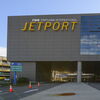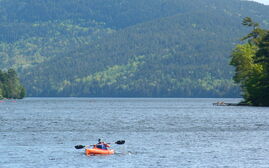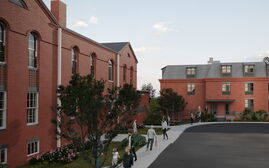UMaine-created technology rocketing to International Space Station
A wireless leak detection system developed by researchers at the University of Maine in Orono is scheduled for liftoff aboard a SpaceX rocket for a 249-mile voyage to the International Space Station.
The loss of air and heat through leaks is one of the major safety concerns for astronauts, and it’s important to find the source and fix it before it’s too late to save valuable air for space missions.
“Our goal is to push the boundaries of hardware and software to design a highly accurate, ultra-low-power and lightweight autonomous leak-detection and localization system for ISS,” Ali Abedi, a UMaine professor of electrical and computer engineering, said in a release.
Using ultrasonic sensor array signals, the flight-ready wireless sensor system can quickly detect and localize leaks. The device’s six sensors detect the frequency generated by the air as it escapes into space and triangulates the location of the leak using a series of algorithms. The device then saves the data on secure digital, or SD, cards that are sent back to Earth.
In advance of the Aug. 1 launch, researchers from UMaine will be working with NASA in a series of tests to prepare three of the wireless leak detectors for space flight.
UMaine electrical engineering graduate students Casey Clark and Lonnie Labonte will perform an electromagnetic interference test and complete the Phase 2 safety review of the prototype at NASA Johnson Space Center in Houston, Texas.
Clark and Labonte developed the prototype from scratch, which includes components created with a 3-D printer and bought off the shelf. Their work followed that of UMaine PhD student Joel Castro and postdoctoral fellow Hossein Roufarshbaf, who developed a leak localization algorithm as part of a previous NASA Experimental Program to Stimulate Competitive Research project.
“This is the first step in a very progressive movement to monitor structural parameters of spacecraft and the ISS,” Labonte said in the release.
Read more













Comments